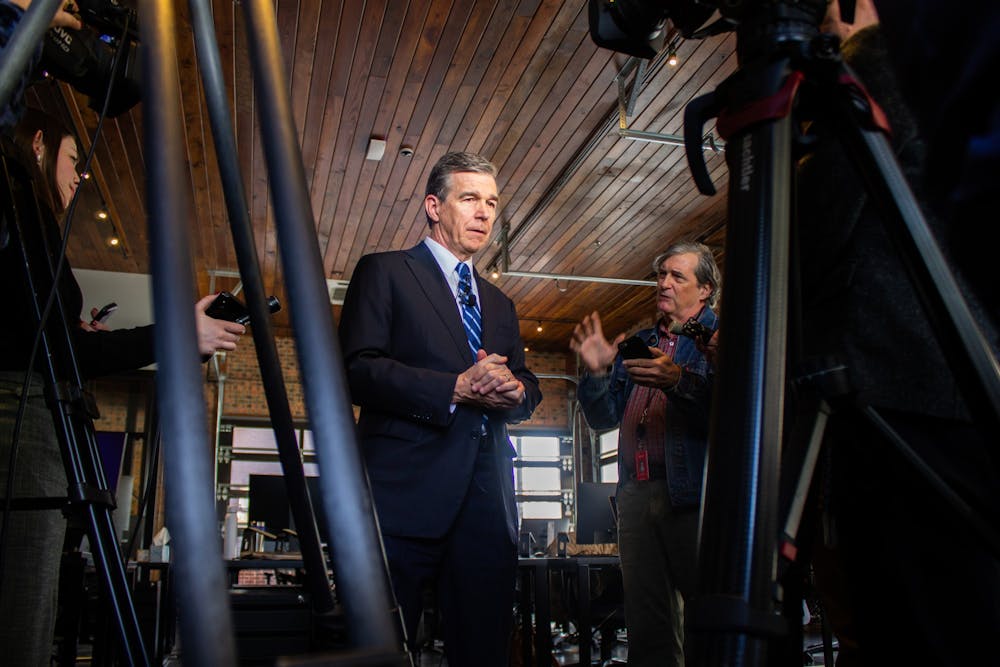“Obviously I don’t agree with every provision,” Cooper said. “But the funding for pandemic support in this budget is critical and must move forward."
Insights from the majority
Patrick Ryan, deputy chief of staff of communications for N.C. Sen. Phil Berger, R-Caswell, Rockingham, Stokes and Surry, said the governor’s recommendations focused mainly on spending the funding the state had remaining from the CARES Act, and the legislature’s latest relief bill aimed to do just that.
He said one of the reasons the General Assembly was reluctant to act on all of the governor’s recommendations was because people paid their taxes earlier than the state expected, which gave the appearance of a budget surplus.
As a result, he said the state had approximately $450 million in additional funding available sooner than it had expected, which Cooper wanted to appropriate in the recent budget bill. He said this would have been irresponsible, since that money could disappear in a couple of months once new budget projections take it into account.
Ryan said he was pleased the legislature was able to allocate funds for PPE, vaccine research and various other support mechanisms for health infrastructure. One of the relief bill’s proposals he appreciated was the Extra Credit Grant program, which provides $335 to eligible individuals to assist with virtual schooling and child care costs associated with the pandemic.
“It seems to be the fairest way to spend that money instead of using it for various pork projects or whatever people want to spend it on,” Ryan said. “We thought it best to just give it back to people.”
He said he was glad to see that the bill passed in both the House (104-10) and the Senate (44-5), and that the governor signed it so quickly.
What does this mean for the budget process in general?
Even though the latest coronavirus relief bill was passed, that doesn’t mean the debate on the budget is over. The General Assembly has still yet to agree on a biennial budget for the 2019-20 and 2020-21 fiscal years, and since they will not return to session until 2021, they may not reach an agreement in this calendar year. This means the state will continue to operate on spending levels from the 2018-19 budget.
Ryan said not having a budget agreed upon before the pandemic turned out to be a blessing in disguise.
The budget standoff, he said, led to there being additional money in government reserves, which he believes needs to be spent incrementally and in the future. He claims allocating the money now could possibly lead to future shortfalls the state could only fix by making harmful cuts to government programs.
To get the day's news and headlines in your inbox each morning, sign up for our email newsletters.
Rep. Robert Reives, D-Chatham, Durham, said he attributes the lack of a budget compromise to the fractious relationship between the executive and legislative branches, which has persisted since Cooper came into office. He also said he doesn't like how some General Assembly members are focusing less on the pandemic and more on other legislative issues.
Though Ryan said North Carolinians should not see major changes in the state’s operations because of the budget impasse, Reives expressed concerns the previous fiscal year’s budget may not be enough to cover present needs. Many of the budget items from last cycle were non-recurring, so major programs could lose funding if an agreement is not reached.
He also said the agreement on the expansion of Medicaid has devolved from an argument on policy to an argument on principle, and that the desire to not expand Medicaid has caused a desire to not negotiate on the budget.
Reives added the Republican majority’s unwillingness to cooperate because of the upcoming elections was another reason why an agreement has yet to be reached. He acknowledged such a mindset was not unique to any one side of the aisle, yet said he believed those who are in the legislative majority should be the bigger person and make strides toward compromise.
“Right now, we’re just in a political world, nationally and at the state level, where our leadership just spends a lot of time trying to figure out how to divide us and how to go after each other,” Reives said, “and that’s just not productive.”
@gmolero1
@DTHCityState | city@dailytarheel.com



